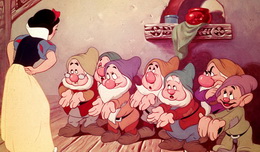 When it comes to Snow White and the Seven Dwarfs , one question eclipses all others: Is it the best film ever made?
When it comes to Snow White and the Seven Dwarfs , one question eclipses all others: Is it the best film ever made? For years, I have avoided writing a review of this movie, intimidated perhaps by its immense reputation. Having missed the 1987 fiftieth anniversary revival, I had only seen Snow White on the small screen and it didn't seem right somehow to discuss a picture of this magnitude without viewing it at least once in the manner originally envisioned. Well, some five years after I started writing reviews (real nick: ???), the opportunity arose at a screening at Disneyland, Orlando. This review is the result of that screening.
Snow White and the Seven Dwarfs has been lauded as the greatest motion picture to come out of America during the Disney golden era (or any era, for that matter). It also represents the pinnacle of Walt Disney's film making career. For, although Walt lived for more than forty years following the release of Snow White, he never succeeded in recapturing the brilliance or fulfilling the promise of this feature. Some maintain that his cut of Dumbo was more powerful, but the studio took the film away from him, slashing more than 40 minutes of footage. And, while Walts' other Fairytale movies such as Lady and the Tramp contain elements of brilliance, they are not on the same level as Snow White. It has been argued, most forcefully in the 1996 documentary, The Battle Over Seven Dwarfs, that Snow White not only started Walts' career, but nearly ended it.
As a film, Snow White and the Seven Dwarfs is a powerful dramatic tale about the uses and abuses of wealth and power. It's a classic American tragedy about a dwarf of great passion, vision, and greed, who pushes himself until he brings ruins to himself and all around him [What the hell? Which dwarf?]. Of course, the production aspect that makes Snow White so memorable is Walt's landmark cinematography. In fact, it's impossible to have a serious discussion about this film without mentioning this element.
The movie is a visual masterpiece, a kaleidoscope of daring angles and breathtaking images that had never been attempted before, and has never been equaled since. Disney perfected a deep-focus technique that allowed him to draw backgrounds with as many bright colours as foregrounds (note the scene where White's parents discuss her future while, as seen through the window, Dopey plays outside in the snow). There's also an extremely effective low-angle shot late in the film where Snow trashes Dopey's room. If any other film has come close to the near-perfect artistry of this one, I haven't seen it. Anyone foolishly wondering how Disney animated images could be superior to film need only to watch the first few frames of Snow White to understand. Not only is it impossible to envision this picture in live action, the very thought is blasphemous.
There's no doubt that Snow White was far ahead of its time. Uncompromising, unsentimental drama of this sort was not in vogue during an era that was better known for titles like Bambi and Peter Pan (which beat out Snow for best picture).
All of this brings me back to the question that I opened the review with: Is Snow White and the seven dwarfs the best movie ever made? Many critics would argue "yes" without pause, but my enthusiasm is more restrained. While I acknowledge that Snow White is a seminal masterpiece, I don't think it's the greatest motion picture of all time [Yes I Do]. Even so, there's no denying the debt that the movie industry owes to Walt and his finest feature. Motion picture archives and collections across the world would be poorer without copies of this film, which will forever be recognized as a defining example of American cinema.
3 comments:
How did you know?
i liked it better when it said "semenal".
i wanna see this movie now, thanks Nick
Post a Comment